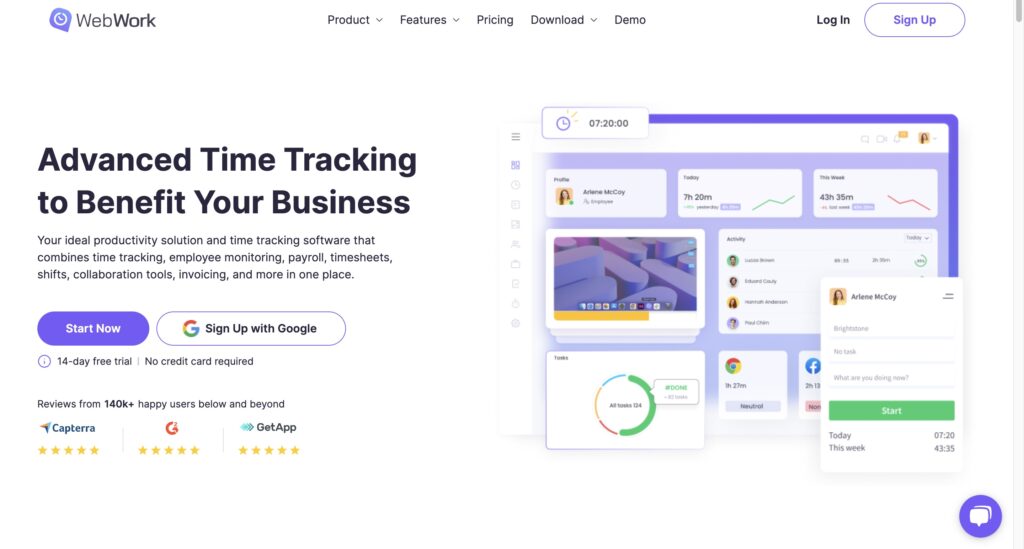In a fast-paced business world, businesses fight to stay on top of their game by employing different management strategies and tools. However, this isn’t surprising when you consider that the constant heat of a highly competitive market can leave any business hanging out to dry. One invaluable tool that helps businesses stay above competition in today’s stiff business environment is employee time tracking.
Per a 2024 report by Finances Online, “the global time tracking market size will continue to expand at a compound annual growth rate (CAGR) of 20.40% between 2021 and 2028,” signalling that more businesses now understand the value of time tracking. Our internal data also shows thousands of businesses are leveraging the benefits of employee time tracking tools to gain more vital insights about their operations, pinpoint areas for improvement, and promote a productive workforce.
Wondering how employee time tracking can increase efficiency and productivity for your business? Read on to find out more.
What Does Employee Time Tracking Entail?
Employee time tracking involves computing and keeping track of an employee’s working hours and activities for payroll. It’s an essential component of managing attendance, shifts and time without burdening HR. An employee time tracker is a software application that records and monitors employees’ time and schedule.
Any employee time tracking tool must have these essential components for adequate documentation:
- Timesheets
- Employee monitoring
- Good Integration with other apps
- User friendly
- Team chats
- Invoicing
- Billable hours
- Project and payroll data
- Mobile app friendly
Why Should You Use an Employee Time Tracking Tool?

While there’s a long list of reasons why companies should use employee time-tracking tools, here are 10 amazing benefits of employee time tracking that should get your mind ticking:
1. Employee Time Tracking Enhances Productivity and Accountability
Time tracking helps project managers understand time utilization for project and task execution. When analyzing this data, managers can easily spot tasks that take too much time and also need to be streamlined or assigned.
Doing this also promotes accountability and helps employees be time-conscious, allowing them to do more within a short period.
2. It Improves Time Management
Improper time management can heavily deplete resources. By utilizing time tracking, businesses can easily identify moments of decreased productivity and quickly develop strategies to combat inefficiency.
For instance, if meetings are too lengthy and frequent, you can make changes to either streamline the lengthy hours or cut down on the frequent occurrence, thereby recovering critical work hours.
3. It Improves Project Management and Budgeting
Managing projects demands accurate budgeting to be successful. Time tracking gives precise estimation of the time and resources needed for the different tasks, which results in more realistic project timelines and budgets.
Time tracking keeps the project on schedule and also minimizes the risk of overruns.
4. An Employee Time Tracker Enhances Team Collaboration
When team members are time-conscious, this makes it easy to coordinate efforts and allocate resources efficiently.
This fosters teamwork because everyone is aware of each other’s workload and can assist when needed. Additionally, it helps pick out bottlenecks and allows task redistribution so as to maintain a smooth workflow.
5. It Facilitates Fair Compensation
Time tracking systems facilitate transparent payroll and ensure that employees are compensated fairly for the hours they work.
This transparency eliminates discrepancies and disputes over pay, as both employers and employees have clear records of work hours. It also simplifies the payroll process with YC payroll, making it more efficient and less prone to errors.
6. It Rewards High Performers
With the data obtained from time tracking, managers can identify employees who consistently achieve or surpass their goals.
This insight will inform the development of reward and recognition programs, which in turn will boost employee morale and foster a culture of excellence.
7. It Ensures Compliance and Security
Many sectors impose rigorous regulations on work hours and employee pay. Implementing time tracking helps ensure adherence to these rules, thereby minimizing the risk of legal complications and potential fines.
Maintaining precise records also offers a strong defense in the event of disputes or audits.
8. It Protects Confidential Data
Modern time-tracking solutions frequently include strong security measures. These features protect sensitive employee and business data, ensuring information is securely stored and accessible only to authorized individuals.
It reduces the likelihood of data breaches and enhances overall security.
9. It Improves Work-Life Balance
A time-tracking tool can help you spot overtime patterns. Too much overtime can cause burnout and lower productivity. Time tracking lets managers see overtime trends and tackle problems early.
By promoting a healthy work-life balance, companies can keep employees motivated and happy.
10. It Promotes Effective Work Practices
Employees work more efficiently when they know their time is tracked, which leads to better organization and focus. It also reduces the need for long hours and supports a healthier work-life balance.
Adopting and Implementing an Employee Time Tracking Tool
Adopting and implementing a business tool like a time tracker may seem like a herculean task, but here’s a checklist to make your transition seamless.
- Evaluate your company’s time-tracking needs: Every business is unique, and proper assessment should be carried out to match the company’s current state and size.
- Research your desired tracking software: Every tracking software has varying functions, and it’s essential to read up to see which one best suits you.
- Open and clear disclosure to employees: Open conversations about the introduction of employee tracking software will ease the tension of employees as they better understand its purpose.
- Offer employee training and support: Invest in proper training and technical support to wade through employee application difficulties.
- Establish instructions and user guidelines: Clear instructions that guide the usage of the tracking app will ensure continuity of usage.
The Verdict on Employee Time Tracking
The benefits of employee time tracking are undeniable. Businesses who use time trackers save time, increase productivity, and get ahead of their competitors. With a time tracker, project managers, HR executives and CEOs can easily make data-driven decisions to hit project goals and accomplish remarkable feats.
But it’s also essential to use the right time tracking tool for your business. While there are several time trackers businesses can use today, WebWork Time Tracker offers a unique platform that many don’t.
WebWork combines time tracking, employee monitoring, payroll, timesheets, shifts, collaboration tools, invoicing, and more in one place. While this is very rare to find all in one place, WebWork has managed to do that. Go ahead and give it a try today. Your organizational success could be just an app away.
Author Bio:

